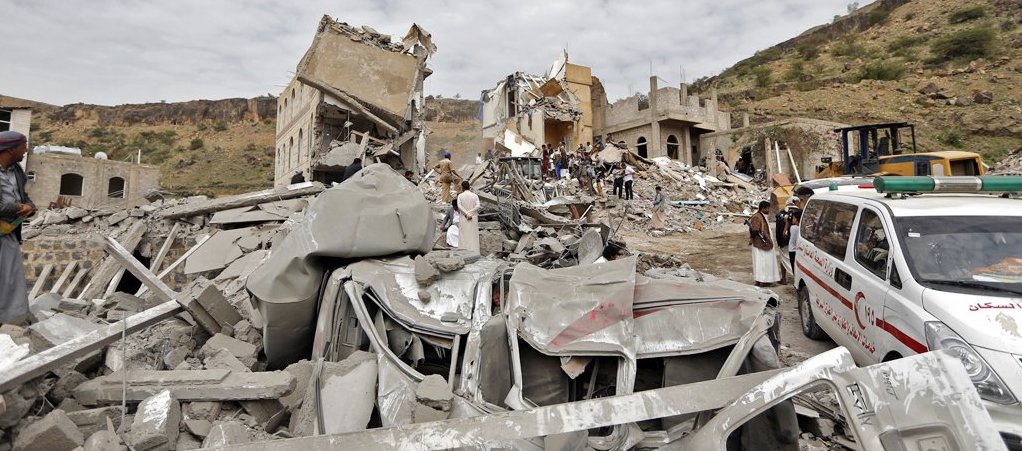في خطوة جيدة لمواجهة الإفلات من العقاب عن جرائم الحرب المرتكبة في اليمن، صّوت مجلس حقوق الإنسان بالأمم المتحدة في 28 سبتمبر الماضي ضمن فعاليات جلسته الـ39، لصالح تجديد ولاية فريق الخبراء البارزين في اليمن، الأمر الذي يضمن استمرار التحقيقات في بلد لا يزال موطنا لـ" أسوأ أزمة إنسانية في العالم" حيث تتعرض حياة ملايين المدنيين للخطر.
كان مركز القاهرة لدراسات حقوق الإنسان، بالتعاون مع شريكته اليمنية "مواطنة لحقوق الإنسان" قد دعيا في مداخلة شفهية أثناء الجلسة لتجديد وتعزيز ولاية فريق الخبراء في اليمن، وتمكينهم من إجراء تحقيقاتهم بشكل نزيه ومستقل حول انتهاكات حقوق الإنسان في اليمن. وقبل انعقاد دورة المجلس، نشرت 55 منظمة مجتمع مدني بيانًا مشتركا حول الحاجة إلى تجديد ولاية فريق الخبراء المشكل العام الماضي لواجهة الإفلات من العقاب الذي يحظى به جميع أطراف النزاع في اليمن.
أكد تقرير فريق الخبراء احتمالية تورط جميع أطراف الصراع في اليمن، في ارتكاب جرائم حرب وانتهاكات للقانون الدولي، حلفت أكثر من 22.2 مليون مدني (75٪ من السكان) في حاجة إلى مساعدات إنسانية. وفي تصريحات لوكالة أسوشيتد برس حذرت منى سابيلا، المسئولة الدولية في مركز القاهرة لدراسات حقوق الإنسان، من أن الفشل في تجديد ولاية فريق الخبراء سيعمل على تمكين الحكومات القمعية التي تريد تدمير نظام الأمم المتحدة لحقوق الإنسان.
من جانبهما أكدا مركز القاهرة ومواطنة لحقوق الإنسان على الدور الفعال لفريق الخبراء لضمان المساءلة الدولية المرتقبة، جاء ذلك في المداخلة الشفهية المقدمة من كلاهما أمام المجلس خلال جلسة المناقشة العامة مع المفوض السامي، وكذا في إطار اللقاء الجانبي الذي نضمه مركز القاهرة مع منظمات أخرى شريكة بعنوان "اليمن: الملايين من المدنيين معرضون للخطر." في هذا اللقاء أكد رئيس فريق الخبراء كمال الجندوبي - في كلمته- على حاجة الخبراء للمزيد من الوقت للتحقيق في جميع الجرائم في اليمن اعتبارًا من سبتمبر 2014، مؤكدًا أن المتاح لفريق الخبراء لم يكن كافيًا لرصد وتوثيق الانتهاكات على الأرض، بينما أكد مكتب المفوض السامي لحقوق الإنسان دعمه القوي فريق الخبراء واستمرار عملها.
قرار المجلس بتجديد ولاية فريق الخبراء لم يكن أمرًا سهلاً أو مؤكدًا رغم فداحة الوضع في اليمن، إذ قادتا المملكة العربية السعودية والإمارات العربية المتحدة حملة ضد قرار التجديد، خوفًا من تحمل المسئولية عن الانتهاكات في اليمن، وهو ما وصفته سابيلا في تصريحاتها قائلة: "لا شيء يسعد السعودية والإمارات أكثر من التخلص من تحقيقات مستقلة حول جرائم الحرب في اليمن." إلا أن ثبات بعض الدول –منها هولندا وكندا وبلجيكا وإيرلندا ولوكسمبورغ- على الدفاع عن شرعية المجلس ودوره في حماية ضحايا انتهاكات حقوق الإنسان، حال دون تعطيل القرار، فجاءت نسبة التصويت على تمديد ولاية فريق الخبراء في اليمن بأغلبية 21 صوتا في مواجهة 8 فقط.
يمثل تجديد ولاية فريق الخبراء نصرًا ودعمًا ملحًا لحقوق المدنيين اليمنيين الذين تتعرض حياتهم للخطر بشكل يومي، في ظل تفاقم الأزمة الإنسانية الكبرى في العالم، ومع ذلك، فالطريق نحو المساءلة والعدالة مازال طويلاً، فمن الضروري أن يواصل جميع أصحاب المصلحة المعنيين مساعدة فريق الخبراء في متابعة المساءلة عن جرائم الحرب المتهم بها أطراف النزاع في اليمن.
Share this Post

